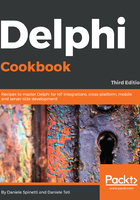
Conventions used
There are a number of text conventions used throughout this book.
CodeInText: Indicates code words in text, database table names, folder names, filenames, file extensions, pathnames, dummy URLs, user input, and Twitter handles. Here is an example: "When we selected the Iceberg Classico style as the default style, the Delphi IDE added a line just before the creation of the main form, setting the default style for all the applications using TStyleManager.TrySetStyle static methods."
A block of code is set as follows:
begin
Application.Initialize;
Application.MainFormOnTaskbar := True;
TStyleManager.TrySetStyle('Iceberg Classico');
Application.CreateForm(TMainForm, MainForm);
Application.Run;
end
Any command-line input or output is written as follows:
$ systemctl disable unit
Bold: Indicates a new term, an important word, or words that you see onscreen. For example, words in menus or dialog boxes appear in the text like this. Here is an example: "If you want to open a separate Terminal window for running and debugging your application, you have to enable the Use Launcher Application checkbox (you can find it in Project | Options | Debugger)."